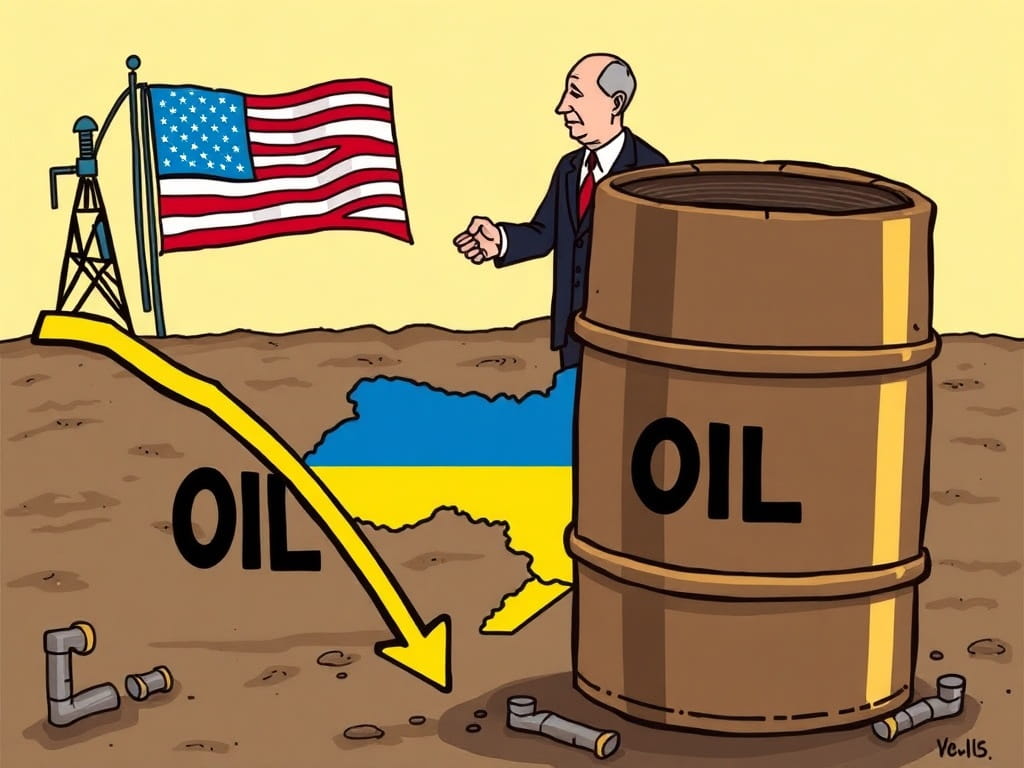BitcoinWorld  Oil Prices Plummet: Crucial Ukraine Deal Hopes Impact Energy Market
Oil Prices Plummet: Crucial Ukraine Deal Hopes Impact Energy Market
Have you been watching the global markets lately? A recent ripple has sent crucial shockwaves through the energy sector, specifically impacting oil prices. Reports circulating, notably from Walter Bloomberg on X, suggest a potential breakthrough: the U.S. and Russia are reportedly working towards a deal concerning Ukraine. This news instantly signals easing geopolitical tensions, leading to a notable dip in crude oil values.
Understanding the Dip in Oil Prices
The immediate reaction in the market saw oil prices respond swiftly. Why did this happen? Global markets often react sensitively to geopolitical shifts. When there’s uncertainty or conflict, supply routes can be threatened, or production might be disrupted. This typically drives prices up. Conversely, news of de-escalation or potential resolution tends to calm these fears, causing prices to fall.
Key Takeaway: Stability often correlates with lower energy costs.
Market Dynamics: Traders anticipate less risk to supply chains, influencing oil prices.
How Geopolitical Tensions Impact Crude Oil
The relationship between geopolitical tensions and commodity markets, especially crude oil, is profound. Major conflicts or political instability in key producing regions can directly affect supply. For instance, the mere threat of disruption can lead to speculative buying, pushing prices higher. Conversely, a reduction in these tensions suggests a more stable supply outlook for the energy market.
Supply Security: Less risk means more predictable supply.
Investor Confidence: Reduced uncertainty encourages more stable investment in the energy market.
The Ukraine Conflict and Global Energy Market Stability
The Ukraine conflict has been a significant factor in the global energy market for quite some time. It introduced immense volatility, driving up gas and crude oil prices due to concerns over Russian supply and broader European energy security. A potential deal between the U.S. and Russia offers a glimmer of hope for a more stable future. This could alleviate some of the pressure on global energy supplies and reduce the ‘risk premium’ currently built into prices.
Impact on Supply: Reduced risk to pipeline routes and production.
Economic Implications: Lower energy costs can ease inflation pressures globally.
What’s Next for Oil Prices?
While the initial dip in oil prices is a direct response to the hopeful news, the long-term trajectory remains subject to many factors. The actual implementation and effectiveness of any U.S.-Russia deal on Ukraine conflict will be crucial. Furthermore, global demand, OPEC+ decisions, and other economic indicators will continue to play a significant role in shaping the energy market.
Monitor Developments: Keep an eye on official announcements and progress.
Broader Factors: Don’t forget demand, economic growth, and supply-side policies.
Actionable Insight: For consumers, sustained lower oil prices could translate to cheaper fuel and goods. For investors, volatility may persist until a concrete resolution emerges.
The recent fall in oil prices underscores the immediate impact of easing geopolitical tensions. The prospect of a U.S.-Russia deal on the Ukraine conflict offers a beacon of stability for the global energy market. While the journey towards a lasting resolution is complex, this initial market reaction highlights the delicate balance between international diplomacy and economic realities. We will continue to monitor these vital developments.
Frequently Asked Questions (FAQs)
1. Why did oil prices fall after reports of a U.S.-Russia deal on Ukraine?Oil prices often fall when geopolitical tensions ease because it reduces concerns about potential disruptions to global oil supply routes and production. A deal signals more stability.
2. How does the Ukraine conflict typically affect the energy market?The Ukraine conflict has historically introduced significant volatility and driven up energy prices due to fears of supply disruptions from Russia and broader European energy security concerns.
3. Are these lower oil prices expected to last?While the initial dip is a direct reaction, the long-term stability of oil prices depends on the actual implementation of any deal, global oil demand, decisions by OPEC+, and other economic factors.
4. What does “geopolitical tensions” mean in the context of oil prices?Geopolitical tensions refer to political conflicts or instability between countries that can threaten the security of global oil supply, leading to uncertainty and price fluctuations in the energy market.
5. Who is Walter Bloomberg, and why is his report significant?Walter Bloomberg is a well-known financial news aggregator on social media (X), often among the first to report breaking financial and geopolitical news, which can quickly influence market sentiment.
Did you find this analysis insightful? Share this article on your social media to help others understand how global events influence the energy market and their daily lives!
To learn more about the latest energy market trends, explore our article on key developments shaping crude oil price action.
This post Oil Prices Plummet: Crucial Ukraine Deal Hopes Impact Energy Market first appeared on BitcoinWorld and is written by Editorial Team

